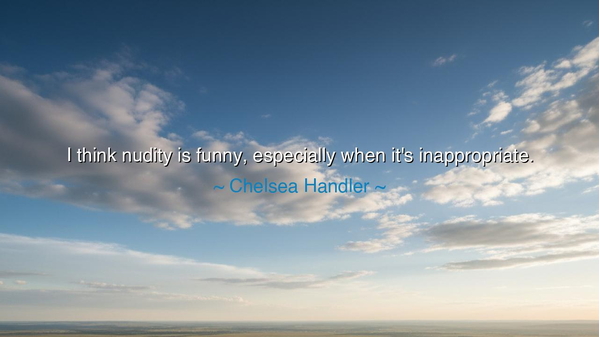
I think nudity is funny, especially when it's inappropriate.






In the daring and humorous words of Chelsea Handler, “I think nudity is funny, especially when it’s inappropriate,” there lies more than jest — there lies a reflection on freedom, vulnerability, and the absurdity of social pretense. Beneath the laughter, her words challenge the ancient tension between what society deems “proper” and what it hides in shame. Handler’s humor, brash yet perceptive, reveals the truth that humor and discomfort often share the same root, and that laughter can dissolve the fear that clings to what is forbidden.
To speak of nudity is to speak of truth itself. Since the dawn of humanity, clothing has been both armor and disguise — a symbol of civilization, modesty, and order. Yet before all that, the human form stood unashamed beneath the open sky. In laughter, Chelsea Handler returns us to that state — not of innocence, but of honesty. By finding humor in nudity, she mocks not the body but the hypocrisy that surrounds it. For in truth, what we call “inappropriate” is often only what we fear to accept as natural. Thus, her laughter becomes a small act of rebellion — a reminder that the body, in all its forms, is not a thing to scorn, but to see with compassion, humility, and joy.
The ancients too understood this paradox. The Greeks, who revered beauty, carved gods and heroes in marble — naked, unashamed, and divine. Yet even they, for all their reverence, used nudity in comedy as a symbol of folly and humanity. In the plays of Aristophanes, the sight of a naked figure often provoked laughter, not from cruelty, but from recognition — the recognition that beneath the robes of kings and priests, all men are equal in their absurdity. In the naked form, both the proud and the meek are stripped of illusion. And so, what is “funny” about nudity is not the flesh itself, but the revelation it brings — that the powerful and the powerless, the refined and the foolish, all share the same fragility.
Handler’s “inappropriate” laughter, then, carries within it a form of ancient wisdom. She invites us to see that humor is a kind of liberation, a tool to disarm the seriousness that often imprisons the spirit. When she finds humor in what is forbidden, she dismantles fear with mirth. For laughter is not merely entertainment — it is a force that reveals the truth without bitterness. The fool, the jester, the comedian — these figures have long been the sacred truth-tellers of civilization, speaking through jest what others dare not say. Chelsea Handler, in her irreverence, stands in that lineage — turning discomfort into understanding, mockery into light.
Consider also the story of Diogenes of Sinope, the philosopher who lived in a barrel and mocked the manners of polite society. When asked why he defied convention, he replied, “I am seeking an honest man.” Once, when the people laughed at his shamelessness — eating in public, dressing simply, and once even walking unclothed — he told them, “You laugh because you fear what is natural.” Diogenes, like Handler, used humor to challenge the artificial walls that society builds between truth and propriety. His “inappropriate” acts were lessons in authenticity — reminders that dignity is not found in hiding, but in embracing what we are without disguise.
In this way, Handler’s laughter at nudity becomes something greater — it becomes a symbol of self-acceptance. To laugh at what others find shameful is to take back power from judgment. In a world that polices bodies and decorum, finding humor in the “inappropriate” is an act of defiance — and of healing. It says, “I will not be bound by your discomfort. I will meet life, and my own body, with laughter.” And in that laughter, shame loses its hold.
The lesson, then, is clear: do not fear what makes you human. See humor in your flaws, in your awkwardness, in your naked truths. Laugh when life exposes you, for that laughter is the sound of courage. When you learn to find joy in what others call inappropriate, you reclaim your freedom. For those who laugh at themselves are unshakable — they have nothing left to hide.
Thus, Chelsea Handler’s words, though spoken in jest, carry the depth of a philosopher’s insight. They remind us that laughter is not only a release, but a revelation. To laugh at the “inappropriate” is to pierce the armor of pretense, to embrace our shared absurdity, and to find beauty even in the uncomfortable. And so, the wise may say: laughter is the truest form of honesty, and those who can laugh at what the world hides are not merely funny — they are free.






AAdministratorAdministrator
Welcome, honored guests. Please leave a comment, we will respond soon